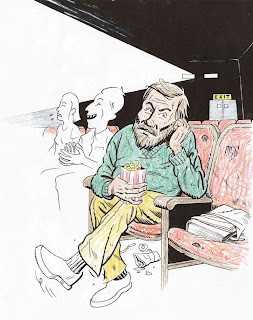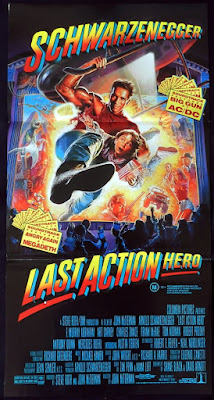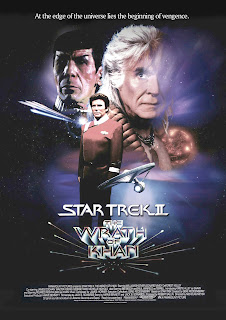 | |
| THE NEVERENDING FILM FESTIVAL #112 Saturday, Nov. 26, 2022 |
Ready for another trip to The Recliner Cinema?
Today it's a parody of mid-20th Century America, two cop/buddy bombs (one of which is pretty good), a conspiracy cover-up, a sci-fi that foregoes any human side, bad dreams of Freddy Krueger, and the return of the Star Ship Enterprise.
• A Nightmare on Elm Street (1984)
• Collision Course (1989)
• Last Action Hero (1993)
• Little Murders (1971)
• The Parallax View (1974)
• Star Trek II: The Wrath of Khan (1982)
• Strange New World (1975)
Same as last time, five out of seven are worth watching — can I pick 'em, or what?
There's no BIG YES, but A Nightmare on Elm Street and The Parallax View both come close.
— — —
A Nightmare on Elm Street (1984)
A high school girl has nightmares of a man with knives for fingernails, chasing her in her sleep and when she's awake.It's a simple idea, turned into a classic of horror: What if your dreams and reality became blurred together, and you sometimes weren't sure whether you were in one or the other?
Written and directed by Wes Craven, this is his most famous and best film. John Saxon plays Daddy, and he's also a cop, but the killer in his daughter's dreams is beyond his jurisdiction.
The girl is Heather Langenkamp, and the movie must've indelibly typecast her — I've never seen her in anything else. She's just right here, though.
"Who do you think you are, whoever you are?"
A deep dark secret in Mom & Dad's past motivates the monster, who is, of course, the now-famous Freddy Kreuger.
The backstory makes Kreuger a perfect right-wing boogeyman: "He was a filthy child murderer who killed at least twenty kids in the neighborhood… The lawyers got fat and the judge got famous, but somebody forgot to sign the search warrant in the right place, and Krueger was free, just like that."
The movie isn't at all political, but I'm going to point out the obvious: No killer of twenty kids has ever gotten off on a technicality.
Heather battles the monster ingeniously — think Home Alone — and Freddy makes some funny noises as she injures him, but there's no silliness here. It's a scary movie, and you will be scared.
Screw all the sequels and knockoffs; this is the real thing — the monster movie of your nightmares.
Verdict: YES.
♦ ♦ ♦
Collision Course (1989)
Collision Course is a clumsy and uninteresting buddy-cop flick, starring Jay Leno and Pat Morita. Leno is famous for his love of cars, so this role must've been written for him — he drives several, there's a shootout at an auto repair shop, and some dull NASCAR action.
Leno's presence is the only clue that this might be a comedy, but same as when he hosted The Tonight Show, there are no laughs.
Verdict: BIG NO.
♦ ♦ ♦
Last Action Hero (1993)
This was Arnold Schwarzenegger's first flop, but when I saw it way back when at the New Mission Theater in San Francisco, I liked it.The New Mission was an old-time movie palace, then in negligent disrepair but since revitalized as Alamo Drafthouse's San Francisco flagship. It was the perfect venue for this, because Last Action Hero is largely set in a faded movie palace just like it.
The movie is an unusual mash-up and send-up of action clichés, co-starring Death from The Seventh Seal. It's way too weird for middle America, which is why it fizzled at the ticket booth, but I remembered it as clever and enjoyable. Was I mistaken?
Nope. It's a huge, expensive movie, but it's fun.
The opening scene has a hundred cop cars parked all around an elementary school where there's a hostage situation. Here comes tough cop Jack Slater (Schwarzenegger, of course), breaking all the rules and disobeying his boss.
It turns out that we're watching another movie in the fictional Jack Slater franchise, and a little kid has been assigned to be supercop Schwarzenegger's new partner. When he's not riding with Arnold, the kid is a big movie buff who's weirdly been befriended by movie palace projectionist Robert Prosky, who has a magic ticket that was given to him by Houdini.
The ticket plops the kid inside Schwarzenegger's next movie, and there are other shenanigans, child endangerment, and switching between movie reality and real reality.
It plays with every movie trope, and nine out of ten jokes fall flat, but that still leaves plenty that are amusing. If you've seen some action movies, it definitely works as a parody. I'm not sure it works as an action movie, since it's all wrapped up around itself and you can't really know what's going on, or at least I rarely did.
Unlike most movie kids in starring roles, the child actor here — Austin O'Brien — is only sometimes annoying.
Prosky's movie palace is great to see, and there are lots of playful cameos from big stars of the '90s. The movie doesn't add up to much, but most action movies don't, and this one's a laugh, or several.
Verdict: YES.
♦ ♦ ♦
Little Murders (1971)
He wrote this, and it's full of wry observations. Almost every scene could've been a Feiffer strip or panel, but can a thousand comic strips strung together be anything but tiresome?
Oh, yeah. It adds up to an unusual, exaggerated but oddly real comedy that takes swipes at family, romance, marriage, and fear of crime in the big city in the 1970s.
Elliott Gould plays Alfred, who's the opposite of most characters Gould played. He's not merely a pacifist, he's a self-described 'apathist' who doesn't care about anything.
In the opening scene, I thought I'd hate him — he's being beaten up by a gang of street kids, and when a stranger named Patsy (Marcia Rodd) comes to his rescue, he sneaks away, leaving her to be attacked by the gang. She escapes, chases him down to tell him what a cad he is, and of course Alfred and Patsy fall in love.
"There's no way of talking someone out of beating you up if that's what he wants to do," so Alfred routinely lets people beat him up. He's always bruised and bloodied. "There's a lot of little people who like to start fights with big people. They, uh, hit me. Hit, and they see I'm not going to fall down. They get tired and they go away. It's hardly worth talking about."
He's an apathist, indeed, so Alfred doesn't want to do much, but Patsy sets about to rehabilitate him, taking him bowling and dancing. She'd take him to bed, but he's too apathetic to be interested. Pretty soon she takes him to meet her parents, and her very strange younger brother, for dinner during an intermittent electricity blackout.
As for Patsy, she says, "Alfred's the only man I know who isn't waiting for me to save him. You know how that makes me feel? God help me, I've got to save him." And later she explains, "I married you because I wanted to mold you. I love the man I wanted to mold you into… I don't want to hurt you, I want to change you."
Through all these funny moments, the story accumulates unexpected heft, as the dialogue and situations reveal more about Alfred and Patsy.
A long-haired Donald Sutherland is the minister from First Existential Church, and he's supposed to perform their marriage ceremony. His scene is a hoot, as he gets so wrapped up in his daffy wedding speech that he seems to forget the part about now pronouncing you man and wife.
Director Alan Arkin gives himself a brief but funny cameo as a detective who specializes in leaving murders unsolved. Based on a play, the movie is kinda theatrical — it feels alive, more than filmed, willing to take chances, and with lots of little moments that feel very Feiffer.
Verdict: YES.
♦ ♦ ♦
The Parallax View (1974)
High atop Seattle's famous Space Needle, there's a fancy restaurant where a Senator gets shot and killed. Then we fast-forward to the findings of a Senate investigation, concluding that the killer was a lone gunman, and that "there is no evidence of any wider conspiracy. No evidence whatsoever."Warren Beatty is a reporter who's convinced himself it couldn't have been a conspiracy, until his ex-girlfriend (they both witnessed the assassination) says she fears for her life. And she should; 6 of the 18 witnesses have already died.
Beatty doesn't believe her, though, until she's dead too. And with that, the mystery is afoot in this very enjoyable and occasionally terrifying paranoid thriller.
There are several fabulous and unforgettable set pieces — the murder and follow-up fight atop the Space Needle, a comical but splendidly-staged bar fight, a great battle under a dam, a killer per-employment psych screening, and the movie's entire last twenty minutes.
Beatty was never flashy on screen, and never one of my favorite actors, and he's his usual presence here. When he first walked into this movie, though, I realized that I've miss him.
Also it must be said, the music is excellent, by someone I'd never heard of — Michael Small. It's sparse and minimal, with repeated teasing before very briefly a melody, and then back to the teasing, and finally, finally the big dramatic theme. The music would have you on the edge of your seat, even if there wasn't a great drama to hang it on (but there definitely is).
One problem, though. For a political thriller, it's oddly apolitical. There's never any mention of political issues, and the script puts awkward extra effort into making sure we never know whether the elected officials portrayed are Democrats, Republicans, or Whigs. That's a mistake, I think — in those moments when politics should be mentioned, the story feels a bit fake and generic.
Screenplay co-written by Lorenzo Semple Jr. (Three Days of the Condor, and 14 episodes of the 1960s Batman). Directed by Alan J. Pakula, whose name ought to be enough to recommend the film. He made some greats, including Klute, All the President's Men, Sophie's Choice — and The Parallax View.
Verdict: YES.
♦ ♦ ♦
Star Trek II: The Wrath of Khan (1982)
The original Star Trek TV show was one of very few where the pilot episode didn't sell the series, but the network funded a second pilot to try, try again."Too intellectual," NBC said of the first pilot, The Cage, "but we like the concept. Can you make it less thoughtful, with more action?" The second pilot, Where No Man Has Gone Before, was smart, too, but less highbrow, and the network bought the show.
(Incidentally, the person who fought hardest to have a second pilot made was Lucille Ball, co-owner of Desilu, the studio which owned the rights. She liked the Star Trek concept, and she was also, of course, the biggest star on TV — even her '60s The Lucy Show was in the top ten. She used her clout to convince the network, and it's fair to say that Star Trek wouldn't have made it onto TV without Lucy.)
Star Trek at the movies had similar problems. The first film drew big crowds of Trekkies, but not enough non-hardcore fans, so it wasn't the box office hit that Paramount had hoped. This second film was in limbo for almost a year before being greenlit at a greatly reduced budget, and the studio wanted more action, less heavy thinking, and lots less involvement by series creator Gene Roddenberry.
They got what they wanted, and like the second TV pilot, the second theatrical movie is a very good blend of action and science fiction. Lots of people still say it's the best of the movies. I pull more toward Star Trek IV: The Voyage Home, but it's close.
"I have been and always shall be your friend."
Ricardo Montalban reprises Khan, the eugenics-created genius from the so-so original episode "Space Seed," and he wants vengeance against Kirk. This is a sequel to that episode, more than to the first movie, but you need not have seen either.
Khan kills a bunch of people, and steals The Genesis Device, new tech that's supposed to create life from lifelessness, but could also be a genocidal weapon.
Written by committee but directed by Nicolas Meyer from the marvelous Time After Time, there's no denying that the story works better and has far fewer boring bits than the first movie.
It also has brain-eating bugs, a great starship shootout, and Montalban quoting Moby Dick, out-hamming Easter dinner. The interplay between Kirk, Spock, and McCoy has never been better, and "introducing Kirstie Alley as Saavik" is quite good as a Vulcan space cadet.
40 years after it was made, you probably know how this movie ends. They even talked about it on Seinfeld, but I won't talk about it here, except to say that it works splendidly. I do wish they'd spent a few thousand dollars on a better set for that climactic scene, instead of plain plexiglass doors and walls that wobble when touched.
Every element seems well thought-out, and William Shatner delivers his infamous "Khan!" scream. It's a good story, albeit sorta CSI: Outer Space, and the action the studio wanted? It never lags.
Verdict: YES.
♦ ♦ ♦
Strange New World (1975)
From the corny dramatic music and fade-outs every twelve minutes, this was obviously made for television. It does not transcend the medium.
John Saxon stars, playing an astronaut in a red toga for unexplained reasons, who was in suspended animation for 180 years. When he gets back, virtually all people on Earth are dead, but James Olson (from 2001: A Space Odyssey) leads an underground society of genetically modified sorta-humans.
What's wrong here is everything. The movie is almost entirely comprised of people talking about their complicated sci-fi situation — surgeries, blood drips, temporary mental regression, decontamination shields, and should a woman be put to death because she's suspected of telling too much to the wrong people? Very nearly no time or dialogue is spent on the characters voicing all this gobbledygook, so with (barely) the exception of Saxon, everyone on-screen is just another walking plot device. There's nobody to give a damn about.
Verdict: BIG NO.
— — —
Coming attractions:
• The Bill & Ted trilogy (1989, 1992, 2020)
• Captain EO (1986)
• Frankenstein Meets the Spacemonster (1965)
• Future-Kill (1985)
• Holy Motors (2012)
• Pee-wee's Big Adventure (1985)
• We Are the Best! (2013)
11/26/2022
There are so many good movies out there — old movies, odd or artsy, foreign or forgotten movies, or do-it-yourself movies made just for the joy of making them — that if you only watch whatever's on Netflix or playing at the twentyplex, you're missing out.
— — —
DVD • public library • streaming
If you can't find a movie I've reviewed,
or if you have any recommendations,
please drop me a note.






.jpg)
Feiffer wrote Carnal Knowledge for Mike Nichols, an extraordinarily misanthropic masterpiece. I don't care for his comics, though.
ReplyDeleteEvery time I think I've seen the last of Gould or Sutherland's 70s films, another one pops up, it's wild.
I just love Pakula's style, even if I don't always like his content. Starting Over is kind of overlooked, a good film and fine turn from Burt Reynolds. And something like Presumed Innocent is great - when's the last time there was an intelligent, well-made adult thriller?
Coming attractions:
I love Holy Motors, as well as every other Leos Carax film. Lovers On The Bridge is my favorite. Denis Lavant is probably my favorite living actor.
We Are The Best is delightful, though I'm prepared to take the blame if you hate it. Excellent double feature with the even better Ladies and Gentlemen, The Fabulous Stains, from 20 years earlier.
Gould or Sutherland starred in most of the 1970s' interesting films, didn't they?
ReplyDeleteI must be mistaken, but when I tried to watch Carnal Knowledge a few months ago, I found myself immune to it, slightly put off by its uncomfortableness. Probably my fault.
Burt Reynolds usually bugs me — the cockiness on his face. Solely on your say-so, I'll look for Starting Over. :)
And of course, everything else you mentioned.
Carnal Knowledge definitely isn't the crowd-pleaser The Graduate was (though that's an incredibly dark film, under the sunny surface).
ReplyDeleteReynolds is a smug dick, no doubt, and exacerbated by his execrable choice in material. When he's cast well, though (Deliverance, Smokey, etc.) he's interesting. Maybe his best performance/film is Bill Forsyth & John Sayles' Breaking In. Very charming film, also features the great Casey Siemaszko.
Have you seen Daryl Duke's Payday or Silent Partner? Rip Torn is excellent in the former, and it's yet another Gould performance in the latter.
Nope, I've never heard of Daryl Duke or Payday or Silent Partner. I *have* heard of Rip Torn, though!
DeleteYou know more about movies than I do, mate. :)
I'll try Carnal Knowledge again. My favorite Reynolds was Boogie Nights, and I read that he hated the movie. Ha!